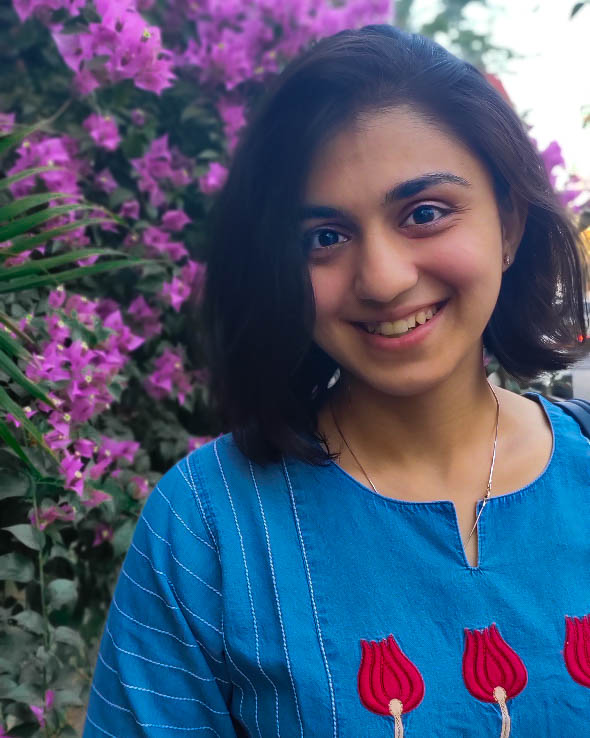
Interviewee – Sailee Pradeep Sakhalkar
Interviewed by Damayanti Dasgupta
Transcribed by Nandini Sinhal
Formatted by Sandhya Sathiaseelan
1. Why is this Erasmus Mundus Scholarship considered important and who can apply for it?
Sailee: It is one of the world’s best scholarships which provides good exposure because of the involvement of colleagues from varied cultural and educational backgrounds. It is also a paid scholarship and only asks for an application fee in a few cases. Moreover, it is accessible to students from all fields and not restricted to only science subjects. It provides you with a very broad experience in terms of academia since you get to work with people from various backgrounds. The topics available are very specialized and not broad which is why one might find something that’s very niche and adaptable to oneself. They have to work for six months if it is thesis based and sometimes students are even free to collaborate and find supervisors outside the course.
2. What are the eligibility criteria to apply for it?
Sailee: Since it is a master’s program, you need to have a bachelor’s degree which need not be from the same discipline in which you want to do your master’s.
3. Do students have to ask for the subjects available for the master’s degree?
Sailee: No, you get a full list on the official website with filters to make your search easier but for your thesis topic you need to discuss it with your supervisor. Additionally, the selected students get to apply for all the other Erasmus Mundus related scholarships and exchange programs.
4. Are there any foreign language proficiency requirements that exist for applying to this scholarship?
Sailee: Having a European language background obviously gives you an edge over others. There may be some courses available of your interest in Spain or France but are taught in their respective languages, in that case, you might miss the opportunity. Although this is not a strict requirement, it restricts you to the courses taught in the English language only. Most science courses are taught in English though but some countries might even require you to take IELTS or TOEFL according to the requirement of the course.
5. What more can students do that would make their CV stand out?
Sailee: Internships oriented towards your interest look great on your CV, especially when aided by publications which although rare for bachelor students. One might say having good academic points matters but those who don’t have it can make up for it with related extracurriculars because the coordinators are quite flexible in this sense and view your profile holistically. Some knowledge about software and analytical skills for science students might also help.
6. What are the minimum cut-off marks for applying for the scholarship?
Sailee: No cut-off really exists. You should have just passed your courses. But since the courses are structured differently in different countries, they ask for a statement of purpose, transcript record, and where necessary, a document stating how to convert your grades to the European grading system, ECTS.
7. What are the documents that need to be submitted apart from the CV?
Sailee: If one has completed their degree, then all of the scorecards from relevant degrees, in most cases bachelor’s and some master’s till the applying time along with those from 10th and 12th can be submitted along with an official document that states that you haven’t graduated yet and will graduate by this/that date. You will also need a passport along with the English proficiency score if needed. Apart from this, the Motivation letter is the most important and probably the trickiest where most students get stuck. One might need to submit three LORs from referees with related educational backgrounds and qualifications depending on the course.
8. Can you give a broad overview of the application process?
Sailee: If you are a bachelor’s student about to graduate in July 2023 so you will apply the year before you graduate. The platforms open in Sep/Oct and deadlines are till November and results are announced by late December or early January. You need to be prepared for what you want to do because you have the option to choose your own trajectory since it is a consortium of many universities and these universities together run the course i.e. you spend one semester in each university and the movement is flexible i.e. according to your own will. For that, you need to figure out in which country you want to live in because you will have to justify your chosen trajectory. You get to choose three courses for each academic year and start making connections with your chosen referees who are reliable. If you are not sure which courses you like, try to get in touch with ex-students from the Indian student community for Erasmus Mundus because they are very approachable. Another way is to find the names from the list of selected students published by the course website on social media platforms.
9. What are some key points to keep in mind while writing the motivation letter?
Sailee: Both personal experiences and academic statements are in balance. Highlight your skills and explain why you are a good fit. Most people miss out on answering why the course should take them as a student, in which case you can say you have a diverse background, you have ambitions that the course is trying to foster.
10. Is there any word limit?
Sailee: You typically have a page and a half so that is basically 1000 words and you can use bolds and italics to highlight some parts so that it saves referee/reviewer time too.
11. What can one do when they don’t have experiences in their CV that aligns with their course?
Sailee: You can envision what the course would give to you i.e. the skills acquired through it will be helpful in what ways, what contributions you can make to the work of XYZ professor, etc.
12. Do students also have to go through any sort of interview or personal interaction with the selectors?
Sailee: They might or might not take an interview, it basically depends on if they think too many of the shortlisted are deserving candidates. So they might take a short interview, which will not be so complex and rigorous, in order to check if students really are what they claim to be on their CV. They want to just get a gist of who you are when they are confused between two students i.e. basically it is filtering in case there is a tie between two students.
13. Does this scholarship help in any way like work visas when one wants to go for a job after their master’s in European countries?
Sailee: For a work visa there is no country-wise restriction when you wanna extend your visa while some countries provide you a few months to years extension to find a job. Although this scholarship provides you an opportunity to do traineeships for 6-9 months in a research environment or business that lets you use the skills you have learned in your master’s. Bagging this scholarship is in itself a good CV booster.
14. Are there any online resources that people can refer to while making/writing their applications?
Sailee: There are many websites tailored to their respective courses. If you look for guidelines on motivation letters, there are tons of websites for them. There are plenty of blogs that can be read where many Erasmus students like to document their travel and also share their experiences on social media too where they do live Q&A sessions too.
15. Since you mentioned that one can choose four countries which we wish to do so is there something to keep in mind while choosing these countries?
Sailee: You are not free to choose any country but the courses run in specific countries which leaves you with limited options. Regarding other options, one might want to explore the country or like the culture or the people living there, etc. Which all depends on each individual’s personal choice. Although people have experienced racism, it is not a major problem also since there are many Indians in European countries, you won’t miss home much.







